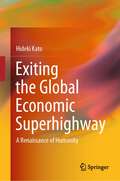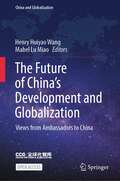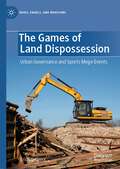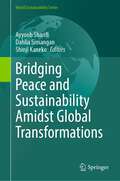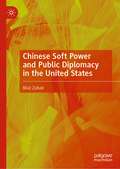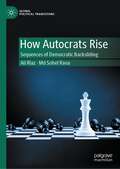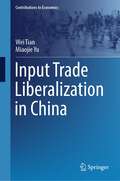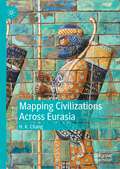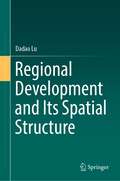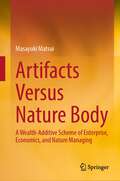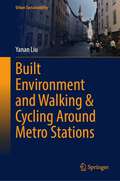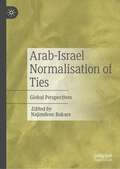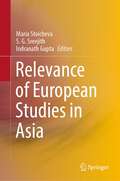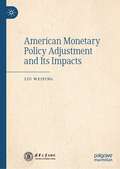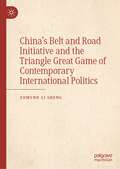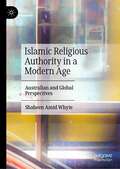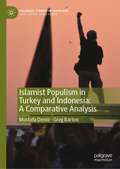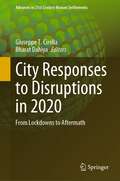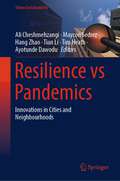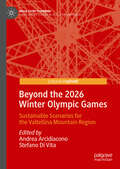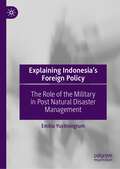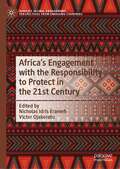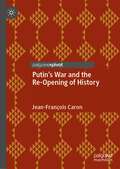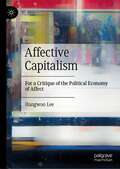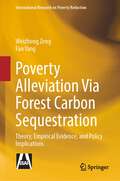- Table View
- List View
Exiting the Global Economic Superhighway: A Renaissance of Humanity
by Hideki KatoThis book tackles global economic and social issues from a perspective that may seem obvious but which no author has yet taken: that we humans are living beings. In today’s artificially globalized world, we have increasingly lost sight of our original humanity. Despite the serious environmental, social, and political problems we are facing, we cannot stop focusing on economic growth, efficiency, and liberalization. In doing so, we continue to make the world “slicker” and more unstable. This book identifies these conventional values and ways of thinking as the root cause underlying many of today’s challenges, and it offers the perspective of a “bumpier” and more organic human existence that provides a greater sense of traction and stability. The book begins with a discussion of global systems and structures, proposing a “world with two systems” to limit the effects of artificially constructed globalization. The second part examines the modern welfare state, outlining a process to revive democracy and social capital by making social issues the business of everyday citizens. The third and final part focuses on human well-being, emphasizing physicality and the Japanese concept of kata as keys to restoring our humanity. Rather than searching for specific solutions through specialized knowledge, this book makes use of the author’s broad perspective acquired through many years of public policy research and reform. It asserts that knowledge should be acquired through hands-on experience and in studies based on real-world situations, involving people at the forefront of society’s challenges, whether politicians, businesspeople, scientists, craftspeople, or farmers. In both its analysis of humanity’s problems and the solutions it offers, this book takes an entirely new yet utterly natural approach to steering humanity off the global economic superhighway.
The Future of China’s Development and Globalization: Views from Ambassadors to China (China and Globalization)
by Henry Huiyao Wang Mabel Lu MiaoThis is an open access book.As the world continues to recover from the fear and uncertainty of the Covid-19 pandemic, a new set of challenges like increased geopolitical tensions and climate change have become increasingly prominent. This open access book, which contains the views of ambassadors to Beijing on topics ranging from bilateral relations to potential cooperation, global development and even more of the most immediate issues, aims to help readers make sense of our changing world and China’s role in it. Building on the success of our previous volume China and the World in a Changing Context: Perspectives from Ambassadors to China, the Center for China and Globalization (CCG) has invited 27 ambassadors to examine China’s role in this context of constant flux, focusing specifically on China’s perspective, including its trade and investment ties with other countries, as well as its role in multilateral regional relations and global governance. These diplomatic envoys from countries around the world serve as pivotal contact points between nations across a wide range of fields, from economics and culture to health and the environment. Their perspectives, representing both developing and industrialized countries, are both invaluable and illuminating—not only in conveying the views and experiences of their own country, but also for their insights into global affairs and China’s development. It is our hope that the views expressed in this volume will inspire even more discussion on the next best step to take in finding solutions to the problems we face, and in particular how China can use its own experience and wisdom to better contribute and engage with the world in finding solutions together. This book provides a wealth of perspective and insight that we hope will benefit not only academics and policy makers, but also the private sector and individuals.
The Games of Land Dispossession: Urban Governance and Sports Mega-Events (Marx, Engels, and Marxisms)
by Erick OmenaThis book offers a comparative study of state strategies in relation to urban redevelopment projects associated with sports mega-events in Brazil, South Africa and the United Kingdom. It examines urban governance strategies employed to dispossess working-class communities of their land and counteract the subsequent emergence of discontent in various national contexts, offering an intricate analysis of the mechanisms of class dominance operating across diverse regions of the globe. This is based on the application of Gramscian theory concerning the capitalist state and its fluid interplay between coercion and consent. Juxtaposing historical trajectories in the execution of redevelopment initiatives linked to large-scale sporting events, the book offers an in-depth examination of the state-civil society relations shaping the London 2012 and Rio 2016 Olympic Parks, alongside the regeneration initiatives concerning the Maracanã stadium in Rio de Janeiro and the Ellis Park stadium in Johannesburg – respectively earmarked for the 2014 and 2010 FIFA World Cups. Drawing on insights from a range of disciplines and an explicitly Gramscian analytical framework, this book will appeal to students and scholars in urban planning, sport sociology, development studies, and human geography.
Bridging Peace and Sustainability Amidst Global Transformations (World Sustainability Series)
by Ayyoob Sharifi Dahlia Simangan Shinji KanekoThis book is the sequel to a well-received book titled ‘Integrated Approaches to Peace and Sustainability’ that aims to further advance the understanding of the dynamic interactions between various components of peace and sustainability. How are peace and sustainability linked to each other, and what are the key parameters that define the nexus between them? This book addresses those questions through a combination of theoretical studies and empirical research that contextualize peace and sustainability issues amid global transformations. The conceptual and empirical linkages between peace and sustainability are widely recognized in academic and policy circles. The adoption of the 2030 Agenda for Sustainable Development confirms this recognition. However, many of the initiatives on peace and sustainability operate in silos, undermining the positive and mutually reinforcing relationship between them. Enhanced integration of peace and sustainability components is imperative for addressing complex challenges that come with global transformations that are manifested environmentally, socially, politically, and economically across levels. It is, therefore, crucial to identify the pathways that enhance the peace-promoting potential of sustainability and the sustainability-promoting potential of peace. The contributions in this edited book elaborate on such pathways by offering insights related to different social, economic, and environmental aspects of the peace-sustainability nexus. Given its inter- and trans-disciplinary focus, the book is of interest to policymakers and researchers working in different areas of peace and sustainability. It contributes to ongoing academic and policy discussions surrounding the outcomes of and challenges to achieving the Sustainable Development Goals (SDGs), particularly SDG 16 on peace, justice and strong institutions.
Chinese Soft Power and Public Diplomacy in the United States
by Bilal ZubairThis book explores Chinese soft power and public diplomacy, and the way that it has played out in the context of the US-China relationship. As tensions between the two countries have grown in recent years, Chinese foreign policy has oscillated between confrontation and conciliation. In this work, which integrates all facets of China’s public diplomacy especially towards United States, the author explores the past and future of Chinese soft power, in a text that will interest diplomats, scholars and journalists.
How Autocrats Rise: Sequences of Democratic Backsliding (Global Political Transitions)
by Ali Riaz Md Sohel RanaFor the past decade and a half, the world has witnessed a precipitous decline of democratic countries and the consequent rise of autocrats. How Autocrats Rise: Sequences of Democratic Backsliding challenges the conventional wisdom and offers an institutional-ideological approach to understand the phenomenon, examines the steps of emergent autocrats, and analyzes the methods of legitimizing their rules. Employing the new framework, the book provides incisive analyses of four countries located in four different regions with dissimilar national features – Bangladesh, Bolivia, Hungary, and Turkey, and demonstrates that political developments in these countries have followed a similar, specific pattern resulting in various shades of autocracy. Theoretically enriched and empirically grounded, this exceptionally timely book makes significant contribution to the democratic backsliding literature while offering insights on how to forestall an autocratic era.
Input Trade Liberalization in China (Contributions to Economics)
by Wei Tian Miaojie YuThis book focuses on input trade liberalization in China and discusses the underlying causes and profound effects of Chinese enterprises facing import liberalization of intermediate input. The content of this book includes ten chapters. The analysis of this book mainly uses academic research, with policy study for a few chapters. Most chapters in this book apply the standard method of contemporary economic systems, integrating into the most advanced economic theories of international trade. The author uses theoretical models to obtain predictions which receive empirical support and carries out strict empirical research using data of China's manufacturing enterprises and China's customs to analyze the causes which affect Chinese enterprises facing import liberalization of intermediate input after China’s reform and opening-up. The suggested readership would be the public who are willing to understand the issues closely related to China’s input trade liberalization and opening-up policy, and basic knowledge in economics would be necessary in understanding the academic research part of the book. Meanwhile, this book is also specifically compelling to business persons and policy makers in that it enables deeper understanding on issues about outward foreign investment of enterprises and China’s opening-up policy and facilitates their decision-making process.
Mapping Civilizations Across Eurasia
by H. K. ChangThis book is a history reader and cultural primer for students and aspiring scholars of past and contemporary interactions among civilizations over the Eurasian landmass. Tracing a human journey that spans several million years, this general survey of civilizations comprises seven sections: Studies on Civilization, Silk Road, Survey of Greater Central Asia, Portrait of India, Persian Cultural Sphere, Caucasus, and Turkish March. The first section introduces methodologies and perspectives for civilization studies. The second focuses on the concept and connotations of the ancient Silk Road as well as China's 21st-century strategic Belt & Road Initiative. In the remaining five sections, the trilingual, peripatetic author, based on his experiences and reflections, provides introductions to and comments on the history, literature, art, social tensions, and future development of five key areas along the Silk Road, i.e., Central Asia, India, Iran, Caucasus, and Turkey.
Regional Development and Its Spatial Structure
by Dadao LuThis book describes the progress and prominent theories of regional development research in the past decades, especially in the past decade, discusses the industrial structure, spatial structure, resources, and environment, as well as a series of practical issues, and reveals the general characteristics of spatial structure evolution in the process of regional development. The research on the issues of regional development has become the frontier of relevant disciplines since the 1950s, and much progress has been made in the process of solving practical problems in social and economic development. This book provides an in-depth and systematic demonstration of the "point-axis system" theory of regional exploitation and development as well as the T-shaped structure of China's regional economic action in theory and practice and discusses the impact of location differential rent, restricted accessibility, technological innovation, etc., on regional development theoretically. This book is used as a reference for planning, scientific research, and teaching personnel in territorial expansion, regional economy, human geography, etc.
Artifacts Versus Nature Body: A Wealth-Additive Scheme of Enterprise, Economics, and Nature Managing
by Masayuki MatsuiThis book proposes a wealth-additive scheme of managing and maximizing (win–win and sharing) the marginal value (eco-entropy) of artifacts by humanizing the artifacts’ enterprise and their economics with nature. This type of clockwork would be achieved on a base of the science of nature versus artifacts and the body of science in my Springer books since 2008. My books are advancing factory science, economics, and the science of artifacts and play their role in the sandwich theory and its pair-map microcosm of the 3D-type, toward the development of body science. Then, the wealth-additive goal of the “body” is not only similar to the marginal profit, GDP, and value in economics, but also means the marginal diversity (eco-entropy) and its wealth of economics versus reliability (sustainability) in the body of the world. The modern world, for example, is faced with deadlocked negotiations over the Sustainable Development Goals (SDGs) bodies at the United Nations. Thus, the forthcoming world of SDGs would be much better and more constructive at transforming traditional bodies of the 3M&I class (human, material, money, and information) as some nano (gene/therblig)-transformation toward eco-entropy(marginal value/diversity) on earth. This semi-visible world is traditionally limited to a molecular size and is too rough at the practical rig-level. Thus, any unsolved and invisible contradictions left behind on earth are subject to SDGs in the practical world. This approach proposes a visible method that could find and solve these contradictions (angles) by transforming the artifact's body, consisting of the 3M&I gene. The pair-map microcosm and its Matsui's M-equation have been designed mainly based on nature and science books on artifacts (in 2016 and 2019). Following these visible methods, our well-being subject might be able to make a breakthrough or make such unsolved contradictions or stalemates subside as any SDGs society of individuals in the near future.Finally, the book will explore and construct a new academic discipline involving 3M&I body science versus cybernetics. And, the study introduces validation cases of convenience stores, self-driving cars, and robotization (individualization) of artificial objects as the realization of the supply–demand system and the ideal form of artificial and natural bodies. Based on this perspective, the dialogue is conducted according to a creative structure of six parts, twelve chapters, and two appendices.
Built Environment and Walking & Cycling Around Metro Stations (Urban Sustainability)
by Yanan LiuThis book explores the relationship between pedestrians/cyclists’ mode and route choice to/from metro/railway stations and the micro-level (street-scale) built environment in a second-tier city in China. More specifically, it investigates how the street-scale built environment influences pedestrians/cyclists’ mode choice and route choice behavior and examines user preferences for the micro-level built environment around metro stations. The focus on a second-tier city is motivated primarily to expand the set of Chinese cities where the effects of the built environment on pedestrian/cyclist mode and route choice have been studied. Results demonstrate the effects of the street-scale built environment on pedestrian flows. The effects are higher for the main road, which is directly connected with the metro station. The findings of this book are expected to support the design of preferred walking/biking built environments around a metro station. This book appeals to urbanists, planners, engineers, policy makers, and those interested in a wide-ranging overview of slow/green transportation and built environment promotion. These methods not only help to understand the quantitative relationship between built environment design and travel behavior but also support the evaluation and assessment of built environment design in urban planning projects. It reduces the gap in our understanding of the quantitative relationship between the micro-level built environment and pedestrians/cyclists’ transportation mode and route choice around the metro station. Both stated choice data and revealed choice data were used. An extended set of micro-level built environment attributes was developed. Besides the widely studied transportation-related factors, street-level built environment factors were studied using quantitative methods.
Arab-Israel Normalisation of Ties: Global Perspectives
by Najimdeen BakareThis book focuses on rapprochement and normalisation between Israel and some Arab countries within the context of global and regional geopolitics, bringing together broader perspectives on transformations resulting from this. The analysis is rooted in a historical and cultural construction of the region as an Islamic sphere viewing Israel as a perpetuation of the Western colonial project in the region. It analyses how this normalisation must not be treated as a novel phenomenon, but as a reconstruction of the past and continuity in tradition geared at regional stability, signifying a wider shift in the structure of the global international system. The first section addresses the international perspectives of the changing dynamics through the lens of US domestic politics, disengagement plans, China’s increasing understanding of the geopolitics of the Abrahamic world. It equally pays enough attention to the attendant implications of this normalisation. The second section of the book explores the reflections of regional (state and non-state) actors, such as Turkey, Iran, Syria, Pakistan, and Hezbollah, and the catalysing effects of this normalisation within and beyond the region. The book is a rich resource for scholars of regional and international relations, in particular Middle East studies. It provides useful reading material for both undergraduate and graduate students of Political Science, think tanks, diplomats, and IR experts and policy analysts, who are desirous of having rich theoretical and empirical underpinnings of unfolding realities in the larger Middle East.
Relevance of European Studies in Asia
by Maria Stoicheva S. G. Sreejith Indranath GuptaThis book provides perspectives on the relevance of European Studies as a disciplinary category for the Asian region. That being the primary focus, the book serves a larger purpose. First, it provides insights on European society, polity and economy (including European Integration) as they are accounted in European Studies. The epistemological character of the knowledge thus conveyed has larger credibility and reliability such that they can become policy inputs and imaginations for strengthening Asian-European relationship. This approach helps overcome the trap of subjectively motivated discourses on Europe which may fail potential collaborations between the regions. Second, the design and discursivity of European Studies will be an instruction to the Asian region on the constitutive potential of regional studies in society-building. Third, the book works towards building the idea of “Europe” in terms of international law, in the minds of Asian students, researchers and decision-makers. This is extremely relevant for the future relationship and cultural engagement between the two regions. The book is of interest to policymakers, academics, embassies, state-level government offices, researchers and students.
American Monetary Policy Adjustment and Its Impacts
by Liu WeipingThis book reviews the historical evolution of U.S. monetary policy, and then uses various methods such as mathematical models and econometric analysis to study the impact of U.S. monetary policy adjustments on the domestic economy and the spillover effects on the world economy. Finally, it summarizes the challenges faced by the Chinese economy in the post financial crisis era and proposes relevant countermeasures and suggestions for China to respond to U.S. monetary policy adjustments.
China’s Belt and Road Initiative and the Triangle Great Game of Contemporary International Politics
by Edmund Li ShengThis book focuses on the triangular relations between China, the United States and the European Union from the perspective of the Belt and Road Initiative (BRI) via the methodology of international political economy. China, the US and the EU are the three most important players in international politics and the global economy, and their relations are accordingly among the most influential in the global arena. This book will argue that the interactions between China, the US and the EU are highly dynamic given their close connections in trade, finance and many other economic fields. In the context of US–China competition, the decisions of the EU, which has sought to remain independent in its foreign policy for decades, crucially shape the landscape of international politics, and lucidly articulates how international relations look from China to scholars of geopolitics.
Islamic Religious Authority in a Modern Age: Australian and Global Perspectives
by Shaheen Amid WhyteThis book situates Australian Muslim experiences of religious authority within the global context of Islam in the modern world. While drawing on examples of Muslim-majority states, new empirical findings indicate the growing diversity of Muslim religious actors in Australia, as well as the contextual realities shaping the way religious authority is legitimised and contested in democratic and authoritarian environments. In particular, the study challenges homogenous articulations of Islamic religious authority in unearthing new voices, epistemologies and socio-political factors shaping Muslim attitudes and experiences of religious authority. The book fills important gaps in the field, such as intra-Muslim relations, female religious authority, digital Islam and the relationship between traditional ulama, reformists and Muslim intellectuals in the West.
Islamist Populism in Turkey and Indonesia: A Comparative Analysis (Palgrave Studies in Populisms)
by Mustafa Demir Greg BartonThis book focuses on the dynamics of democracy and populism in Muslim-majority countries, such as Turkey and Indonesia. It does so by examining the complexities of democratic development in these areas, ranging from 'flawed' to 'hybrid' regimes. Despite the aspirations for democratic progress, recent democracy indices reveal a concerning trend of backsliding, particularly in the last decade. This regression can be attributed, in part, to the ascendancy of populist politics.Populist movements have adeptly exploited both real and perceived cultural insecurities to acquire, consolidate, and maintain political power. This phenomenon is especially pronounced in flawed democracies and hybrid regimes within Muslim-majority countries, such as Turkey and Indonesia. Notably, religion, specifically Islam, has emerged as a central tool within the populist playbook. Populist actors have constructed a religious-civilizational framework that leverages political binaries, manipulates insecurities, and fosters traditional anti-elite and anti-'other' sentiments. In this book, the authors advance the notion that populism is a multifaceted phenomenon that relies on various pre-existing fractures within societies and cultures. Once in power, populism intensifies these differences to further consolidate its position, utilizing various state apparatuses such as state-controlled religious institutions. This comprehensive analysis offers insights into the growing trend of populism in the Muslim world and its impact on contemporary politics.
City Responses to Disruptions in 2020: From Lockdowns to Aftermath (Advances in 21st Century Human Settlements)
by Giuseppe T. Cirella Bharat DahiyaThis book presents the integrating of economics and urban geography to create a framework of cooperation around the idea of urban economic stability. It explores these disciplines through the economic lens and creates a collaborative environment for addressing the global challenges caused by the COVID-19 pandemic and future global shocks. Environmental advocates and proponents of economic growth are increasingly at odds—having looked at the economic impact of the decline of the environment as well as the environmental loss that occurs with unchecked growth and urbanization. The outbreak of the COVID-19 pandemic changed the global scene. The world shook in its foundations, as a number of countries’ lockdown affected not only the global economy but also society and the environment. The global community has seen the negative impact of COVID-19 on our economies. There have been steep declines in gross domestic product, job losses have been in the millions, and people have seen their incomes fall. An unplanned shutdown has taken its toll and has been a shock to the economies of the world. Past shocks and how they have impacted urban economies as well as for how long are core to bettering our understanding of present and future urban economic change. The underlying economic factors that make a shock more damaging to certain economies or industries, as well as understanding these vulnerabilities, help entities recover from economic shocks and allow them to better understand how impacts on individual businesses can be implemented. The pandemic revealed the need to adopt a global development approach, taking into consideration four dimensions: global value chains, debt, digitalization, and the environment. Topics related to the causation and lockdown are explored through a number of case studies from around the world.
Resilience vs Pandemics: Innovations in Cities and Neighbourhoods (Urban Sustainability)
by Ali Cheshmehzangi Maycon Sedrez Hang Zhao Tian Li Tim Heath Ayotunde DawoduThe COVID-19 pandemic and other highly transmissible diseases outbreaks have given a new significance to the concept of “resilience”, placing it in the spotlight of built environment-related studies. New directions have emerged from expanding on adaptive planning, urban layouts, urban morphologies, spatial planning, healthy cities, etc. To enhance resilience in the post-pandemic era, various theories, practices, and hypotheses are being formulated by scholars around the world.For this book project, we invite chapter proposals that provide forefront discoveries about the built environment resilience during and after the ongoing pandemic. Historical perspectives of resilience and other highly transmissible diseases are also relevant to understanding the COVID-19 issues. The authors are encouraged to elaborate on critical exploratory, innovative, and cutting-edge research approaches, highlighting the effects of COVID-19 and other highly transmissible diseases in the design, planning, and perception of the built environment. We aim to gather scientific experiences, reviews, analyses, discussions, recommendations, and solutions in the fields of urban planning, urban design, urban management, environmental science, architecture, etc.The book aims to document resilience-related innovations and new perspectives for the built environment, how people’s interactions adapt to new realities, and which mechanisms, tools, and strategies are required for such transformations in the following two scales of the built environments:(1) City/district; research on planning, commuting and mobility, politics, urban configurations, regulations, transmission and prevention, models, top-down processes, innovation processes, etc.(2) Community/neighborhood; research on collaboration, transmission and prevention, isolation and quarantine, social aspects, accessibility to services, technologies, education, policies, and innovative solutions.The book covers a wide range of studies, including physical and non-physical studies, which may refer to the city infrastructure, green/blue spaces, housing, policy-making, health services, social and economic issues, etc. The findings and results contribute to the decision-making of governments, organizations, and institutions, as well as inspire scholars and future research for developing resilience in the post-pandemic era.
Beyond the 2026 Winter Olympic Games: Sustainable Scenarios for the Valtellina Mountain Region (Mega Event Planning)
by Andrea Arcidiacono Stefano Di VitaThis volume offers a novel study of the Milan-Cortina's Winter Olympics 2026, with a focus on the mountainous region of Valtellina. It brings an up-to-date analysis of the complex interactions between mega-events and remote areas, both in terms of potentials for regeneration and risks for further segregation. Remote areas are traditionally characterized by socio-economic and spatial disparities. On the one hand, they benefit from attractive features, such as environmental and landscape resources, food and wine production, and energy production. On the other, they are by definition fragile environments, disrupted by the contradictions of international tourism, climate change, limited infrastructures and services, rural abandonment, and demographic decline.This book offers credible solutions for the sustainable development of mountainous regions as a legacy of Winter Olympics. It is an essential resource for scholars, professionals, and policy-makers in the fieldsof urban planning and design, architecture design, geography, sociology, and economics.
Explaining Indonesia’s Foreign Policy: The Role of the Military in Post Natural Disaster Management
by Emilia YustiningrumThis book examines Indonesia’s post-Aceh tsunami disaster management through the lens of a multifaceted foreign policy decision-making process involving a variety of bureaucratic actors. It argues that organizational structure and bargaining aspects are as important as power and interests in explaining foreign policy making in the Indonesian context. When the Aceh tsunami struck in late 2004, the use of foreign military assets in responding to natural disasters was not a common feature in Indonesian history—Jakarta remained reticent to engage foreign military enclaves within its own territories. This greatly affected Indonesia’s security cooperation with other countries, including Australia. Prior to the Aceh tsunami, natural disaster management was a domestic political issue. The unprecedented decision by the government of Susilo Bambang Yudhoyono to approve foreign military assistance for military operations other than war (MOOTW) in Aceh was a result of domestic and international factors. This book addresses timely yet fundamental questions about Indonesian foreign policy decision making that led to the involvement of foreign militaries in the country’s worst-ever natural disaster. As a former colony that prized the value of non-interference, the Indonesian government had to make a difficult decision about whether to accept offers of international assistance from countries including Australia. With this, the book explores why the Indonesian government decided to approve Australian humanitarian assistance following the 2004 Aceh tsunami, and how governmental agencies managed this assistance.
Africa's Engagement with the Responsibility to Protect in the 21st Century (Africa's Global Engagement: Perspectives from Emerging Countries)
by Nicholas Idris Erameh Victor OjakorotuThis book sheds light on the practice, challenges, and prospects of the Responsibility to Protect (RtoP) amidst wide contestation, backlash, operational challenges, and expectation gaps associated with the theory and practice of the RtoP. Diverging from existing works, it provides a renewed perspective and alternatives for future deployment of the RtoP and critical insights to the readers on how issues such as support, consolidation, and institutionalization within the broader context of regional dynamics of the RtoP can be best achieved in Africa. The book will be of particular interest to diplomats, international relations experts, scholars, RtoP advocates, the United Nations, and the African Union.
Putin’s War and the Re-Opening of History
by Jean-François CaronThis book explores the emerging politics of Eurasia from the vantage point of Kazakhstan. Vladimir Putin’s decision to invade Ukraine in February 2022 has led to the end of the post-Cold War paradigm of liberal convergence and has triggered a geopolitical shift that will lead to the establishment of a renewed bipolar world order. However, if Russia is responsible for that shift, it will most likely not be the power that will be the leading force of the anti-Western bloc. The leading force of this emerging bloc will rather be China to which Russia is inevitably destined to be relegated as a junior partner in Beijing’s geopolitical orbit. This book, analyzing the geopolitics of a changing region, will interest scholars of international relations, Eurasia, and the economics of energy.
Affective Capitalism: For a Critique of the Political Economy of Affect
by Hangwoo LeeDrawing on Tarde's and Deleuze’s monadology, this book investigates the affective turn of contemporary capitalism. The concept of affect provides critical insight to overcome the limitations of social constructivism and cognitive capitalism. Affective capitalism transforms the population’s everyday bodily experiences into quantitative metrics that can be observed, measured, and processed on a non-conscious register, turning them into dividuals prepared to react and be affected by specific information at a given moment. In an era where social wealth increasingly relies on the 'social factory,' algorithms and big data constitute the living labor beyond employment. This book argues that affect also holds a potential for dismantling today’s real subsumption of life by capital. The network effect, mostly actualized as a company's market capitalization, is constantly traversed by the molecular becoming of affect, leading to new assemblages, such as free software movement, decentralized platforms, peer-to-peer networking, blockchain, and universal basic income.
Poverty Alleviation Via Forest Carbon Sequestration: Theory, Empirical Evidence, and Policy Implications (International Research on Poverty Reduction)
by Weizhong Zeng Fan YangThis book focuses on two issues: the creation of benefits and opportunities for the poverty-stricken people and the trade-off between FCS and poverty alleviation. At the theoretical level, it explains the essential characteristics of PAFCS, analyses the impact mechanism of FCS projects in poverty alleviation, clarifies the stakeholders and their interests and demands, and delineates the dynamic mechanism of FCS projects and poverty alleviation. Based on this theoretical framework, the current situation and challenges for PAFCS in southwest China's ethnic areas are examined in depth. Project performance was quantitatively measured both for projects themselves and for community farmers. The research emphasises that FCS projects in poverty-stricken areas are not the same as PAFCS, highlights the combination of poverty alleviation theory and ecological compensation theory, and considers PAFCS as an intersection of poverty research and ecological compensation research. Additionally, theresearch suggested that FCS projects are not general poverty alleviation projects, highlights the need for full respect to be granted to the subjective will and value judgement of farmers, including poverty-stricken farmers, takes the lead in focusing on the win–win goal of combating climate change and reducing poverty, and makes a breakthrough in researching some key issues that need to be solved in the practice of PAFCS in the ethnic areas of Southwest China. This book is helpful for global scholars in the field of sustainable development, anti-poverty and forest carbon sequestration, government officials, and organisations in developing countries concerned with agricultural development, forestry economy, and sustainable development, as well as all the people around the world who want to find innovative solutions in the climate negotiations.
